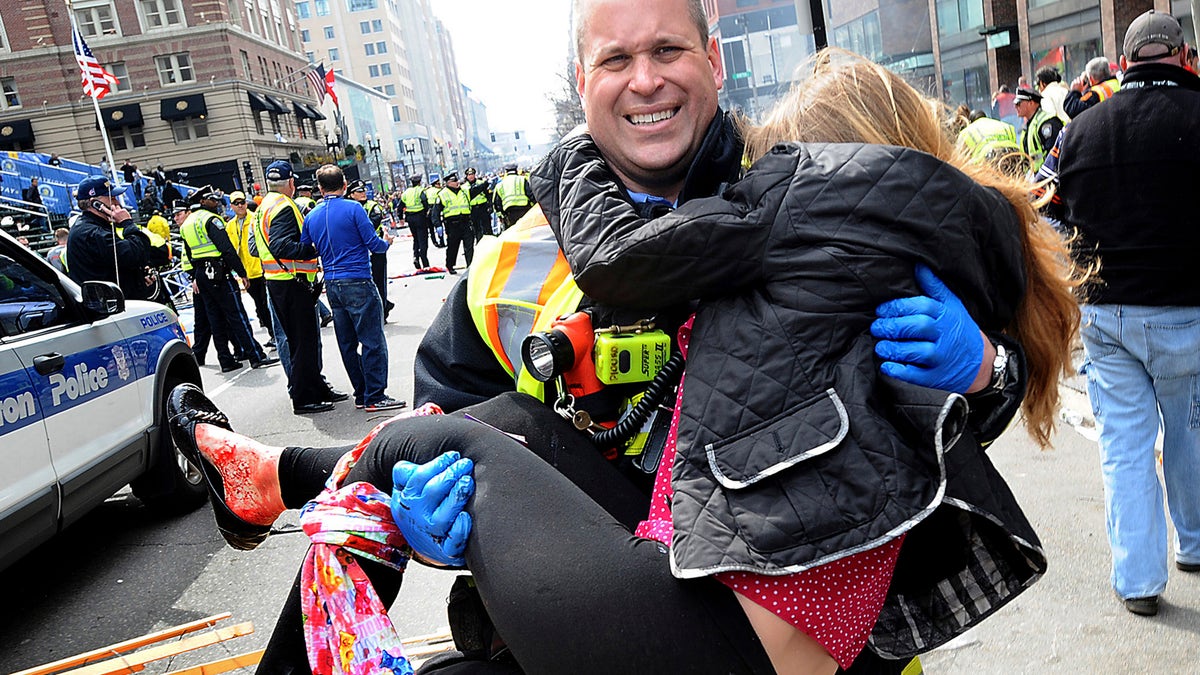
Boston Firefighter James Plourde carries an injured girl away from the scene after a bombing near the finish line of the Boston Marathon in Boston. (AP Photo/MetroWest Daily News, Ken McGagh, File) (METROWEST DAILY NEW2013)
Using belts, shirts and other materials, rescuers at the Boston Marathon bombings turned to a millennia-old medical device to save lives — the tourniquet.
In their fast-acting bids to prevent major blood loss, shock and death, doctors at Boston area hospitals said such fast work no doubt saved many lives.
However as recently as the early 2000s, use of the tourniquet was still enmeshed in a long standing controversy in the medical community about whether they were more trouble than they were worth.
"Some people saw them as lifesaving, and others said they were the instrument of the devil," said Dr. John F. Kragh Jr., an orthopedic surgeon with the U.S. Army's Institute of Surgical Research in Texas.
Although tourniquets have been used to stem blood loss since at least the time of the Roman Empire, modern military surgeons had grown to doubt it. There were no good studies proving their benefit. And there was a common belief that some tourniquets could do more harm than good, cutting off blood and oxygen to limbs and resulting in amputations.
"There are a number of ways to mess it up," said Kragh, who is a leading researcher on methods to control bleeding.
"In Vietnam, tourniquets were not typically used" because it was thought they led to many amputations, said Dr. Kevin Kirk, an Army lieutenant colonel who is chief orthopedic surgeon at San Antonio Military Medical Center.
That's because tourniquets often were placed too high above the injury, leading to loss of tissue that otherwise might be saved, he said. Now they are used lower, and "a lot of lives and limbs have been saved by the use of a tourniquet," Kirk said.
The American Red Cross came to call tourniquets a last resort for stemming severe bleeding.
The dust settled only in the last decade, according to some experts, following publication of studies from the Iraq war by Kragh and others that showed tourniquets were clear-cut lifesavers. Those studies showed timely use of tourniquets could raise survival rates as high as 90 percent. Tourniquets are now routinely issued to soldiers.
However, some experts remain cautious about their use. The Red Cross, for example, continues to worry that tourniquets may be used improperly or in situations when blood loss is not great enough to warrant their use.
"Clearly, if a leg is blown off, it's OK to go straight to tourniquet," said Dr. Richard Bradley, a member of the Red Cross's scientific advisory council.
But the Red Cross continues to advise that direct pressure be applied to a wound in less extreme situations.
Tourniquets should be at least 1½ inches wide, and pulled very tight, to properly shut off blood flow. Medical supply companies make tourniquets that do the job best.
Bradley also stressed that it's important to use a real tourniquet if possible. News coverage of the Boston tragedy describes emergency responders using all sorts of things as makeshift tourniquets, including neck lanyards.
"Is a lanyard better than nothing? Probably," Bradley said. But other kinds of care, and rapid transport to hospitals, may have been at least as important as tourniquets, he added.
Monday's blasts injured at least 170 people near the finish line of the Boston Marathon. Three spectators died and 13 people lost one or more limbs.
Nicholas Yanni of Boston was with his wife and friends watching another friend cross the finish line when the explosion occurred. Yanni's wife had an injury to her lower left leg. Another woman with them had a leg injury, too. Yanni ducked into a nearby sports store for T-shirts that they tore to create a tourniquet.
At Tufts Medical Center, surgeons fixed the smaller of the two bones in her lower left leg that was apparently shattered by shrapnel from the blast.
"My worst fear was that I could have lost my wife. Other than that it was autopilot, adrenaline, chaos. There was a lot of just 'not-even-thinking,' sort of animalistic, you know, thought. What needs to be done, you do it," Yanni said.
Based on reporting by The Associated Press.
Follow us on twitter.com/foxnewslatino
Like us at facebook.com/foxnewslatino
